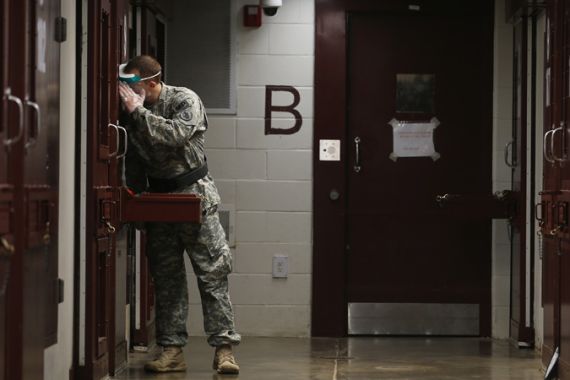US to resume Guantanamo genital searches
Court overturns full body inspections ban and gives government time to appeal against original ruling.

The US government has won a federal appeal to continue genital searches of inmates at the Guantanamo Bay US Naval Base in Cuba..
The ruling on Wednesday granted a temporary delay in enforcing a court order that banned the practice of full body inspections and gave the Obama administration time to mount a full appeal.
The searches were initiated in the past few months, and included frisking of the groin and anal areas before prisoners were taken from their cells to meetings or to phone calls with their lawyers, and after they returned.
Lawyers for Guantanamo prisoners said that some detainees found the new searches so disrespectful towards their religion that they chose to forgo talking to their lawyers to avoid them.
In a one-sentence order, the US Court of Appeals for the District of Columbia Circuit stayed a ruling by US District Judge Royce Lamberth last week that had stopped the searches and asked for further written briefing.
Justice Department lawyers Matthew Collette and Edward Himmelfarb wrote: “The full-frisk search procedure used by Joint Task Force-Guantanamo is the standard procedure used at all Army facilities, and similar or more invasive procedures are used for pretrial detainees held in civilian facilities in the United States.”
The department had asked the US Court of Appeals to rule by 1pm on Wednesday – one hour before a scheduled telephone call between a Guantanamo detainee and his lawyer that the government wanted conducted under rules Lamberth had banned – including searching the inmate’s groin area for contraband.
But the appeals court did not rule in time, and the lawyer, Jennifer Cowan, said that the government had agreed before the appeals court ruling not to conduct the searches in connection with that call.
Cowan said in an interview that after the 90-minute call her client told her through a translator that he was “delighted” not to have his genitals searched on the way to the call, but he was disappointed when she told him about the appeals court order. Cowan said that she too was disappointed.
“The district court merely ordered them to revert to the protocol that had been in place for many years, so that could have stayed in place while the appeal is pending,” Cowan said.
‘Routine security procedures’
In court papers, the government argued that Lamberth’s order would weaken security at Guantanamo by making it harder to prevent smuggling of contraband.
It said that the ruling, in which Lamberth had concluded that the motivation for the searches was to deter detainees’ access to lawyers, went where no other court had gone before.
“For the first time to the government’s knowledge, a federal court has restricted a military commander from implementing routine security procedures at a detention facility holding enemy forces, notwithstanding the universally recognised need for the maintenance of discipline and order in those facilities,” the government wrote in its motion with the appeals court.
Detainee lawyer David Muraskin said that the administration’s position was disappointing in light of Obama’s stated commitment to close the prison at Guantanamo.
“It’s staggering that the government is willing to go to these lengths to enforce procedures that they know violate the detainees’ religious beliefs,” Muraskin said.
The US military holds 166 detainees, captured abroad on suspicion of “terrorism,” at Guantanamo.